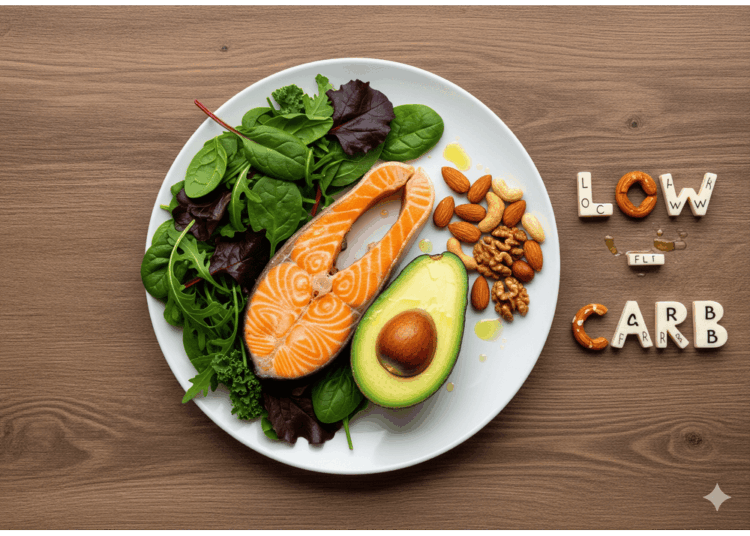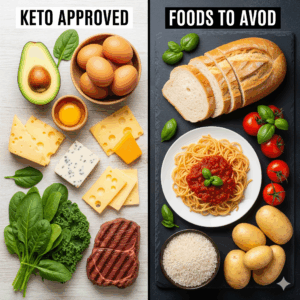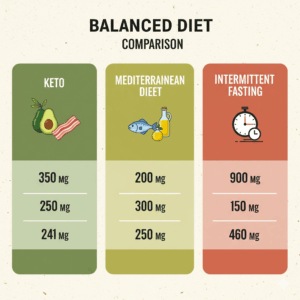What Is the Keto Diet?
The keto diet, short for ketogenic diet, is a high-fat, low-carbohydrate eating plan designed to shift the body into a metabolic state known as ketosis. In ketosis, the body burns fat for energy instead of carbohydrates, producing compounds called ketones as an alternative fuel source.
Originally developed in the 1920s as a treatment for drug-resistant epilepsy in children, the keto diet is still used medically for seizure management. Over the last decade, however, it has become one of the most popular diets for weight loss and metabolic health.
But the question remains: is the keto diet good for you, and what do you need to know before starting?
The Basic Rules of the Keto Diet
There are several variations of the keto diet, each with slightly different macronutrient breakdowns. Here are the main approaches:
1. Classic Keto Diet
-
Extremely high in fat, very low in carbs, and moderate to low in protein.
-
Uses a strict 4:1 ratio of fat to protein and carbs combined.
-
Meals must be carefully weighed and portioned.
-
Foods include avocado, oils, cheese, heavy cream, and fatty fish.
2. Modified Keto Diet
-
Slightly less strict than the classic version.
-
Typically follows a 3:1 ratio of fat to protein and carbs.
-
Allows slightly more protein and limited carbs, though still restrictive.
3. Modified Atkins Diet
-
More flexible and user-friendly.
-
High in fat, very low in carbs, but allows more freedom in protein intake.
-
Popular among people seeking weight loss without extreme food weighing.
Foods You Can Eat on the Keto Diet
Following the keto diet means focusing on low-carb, high-fat foods:
-
Dairy: full-fat cheese, plain yogurt, heavy cream.
-
Low-carb vegetables: leafy greens, broccoli, zucchini, peppers.
-
Plant-based options: nuts, seeds, avocado, olives.
-
Fats and oils: olive oil, coconut oil, butter.
-
Proteins: seafood, poultry, eggs, and meat in moderation.
-
Occasional fruits: small servings of berries.
Foods to avoid include pasta, rice, bread, potatoes, beans, legumes, corn, peas, sugary desserts, and most fruits.
Health Benefits of the Keto Diet
Many people adopt the keto diet for weight loss, but it has additional health benefits as well.
Helps with Weight Loss
By restricting carbohydrates, the body naturally reduces calorie intake and burns fat for energy. Some studies suggest that the keto diet suppresses appetite and helps avoid overeating. However, maintaining weight loss long-term can be challenging once carbs are reintroduced.
Supports Type 2 Diabetes Management
For some people with type 2 diabetes, lowering carb intake helps regulate blood sugar and reduce dependency on medication.
Epilepsy and Seizure Control
The original medical use of the keto diet remains valid—patients with drug-resistant epilepsy may see fewer seizures when following this diet.
Risks and Drawbacks of the Keto Diet
While the keto diet has benefits, it is not without risks:
Nutrient Deficiencies
Since the diet restricts many fruits, vegetables, and grains, it can result in low levels of vitamins A, E, B6, folate, calcium, magnesium, and potassium.
Heart Health Concerns
High intake of saturated fats could negatively affect cholesterol and heart health if not balanced with healthier fats.
Digestive Issues
The lack of fiber in the keto diet often leads to constipation and gastrointestinal problems. A low-fiber diet can also increase the risk of colon cancer.
Side Effects of the Keto Diet
Many people experience side effects when starting the keto diet:
-
Keto flu: fatigue, headaches, and irritability during the first week.
-
Cholesterol shifts: some see improved HDL and triglycerides, while others may develop higher LDL.
-
Bone health issues: long-term use may weaken bone strength.
-
Electrolyte loss: reduced sodium and mineral levels may require supplementation.
Taking a multivitamin with minerals is often recommended for those on a strict keto plan.
Keto Diet and Brain Health
The keto diet has shown potential benefits for the brain beyond epilepsy. Researchers are studying its impact on Alzheimer’s, Parkinson’s, and other neurodegenerative diseases. Ketones may provide neuroprotective effects and support cognitive function, though research is ongoing.
Keto Diet and Athletes
For athletes, the keto diet can impair performance, especially in high-intensity training. Carbohydrates are the body’s preferred energy source for quick bursts of activity, and restricting them may reduce endurance and muscle recovery. Most sports nutrition experts do not recommend keto for athletes.
Alternatives to the Keto Diet
If the keto diet doesn’t suit your lifestyle, other eating plans may be better options:
-
Intermittent Fasting: focuses on meal timing rather than specific foods.
-
Mediterranean Diet: plant-based foods, fish, olive oil, and proven heart benefits.
-
MIND Diet: similar to Mediterranean but tailored for brain health.
Final Thoughts: Is the Keto Diet Right for You?
The keto diet can be effective for weight loss, diabetes management, and epilepsy treatment. However, it comes with risks like nutrient deficiencies, heart health concerns, and digestive problems.
If you are considering this diet, it’s best to consult a healthcare provider or registered dietitian. A structured plan and regular check-ups will help minimize risks and maximize potential benefits.
For deeper insights into global health, nutrition, and lifestyle trends, explore IMPAAKT – your top business magazine.














